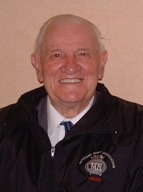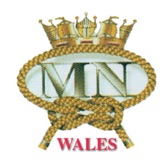First Trip - By Fredrick Norman Jenkins

On Tuesday June 6th 1939 Norman Jenkins was offered a berth as Cabin Boy on the S.S. Graig. The vessel was berthed at the coal hoist on the south side of Roath Dock Cardiff loading coal for Santa, South America for the Argentina Railway Company. He reported to the Shipping Federation, Mount Stuart Square, Cardiff for a medical and was passed fit by Dr Mitchell, and had a photograph taken for his Argentine passport. Later that day he went onboard the Graig to let the Chief Steward know he would be joining the ship the next day. On completion of loading the vessel was moved from the Roath Dock to the west end of Queen Alexandra Dock. These are his own words describing some of his experiences on his first trip to sea.

“On Saturday 10 June we sailed on the afternoon tide and my thoughts were of my chums going to the places we use to go after finishing work. So down we sailed not knowing what to expect. My first encounter with the Chief Officer Mr Owen Thomas from Cardigan, West Wales was when I was shaking the coconut runners of coal dust on the deck as the deck crew washing down the coal dust off the deck and paintwork. I got a few words from him which was a telling off and I just looked at him in surprise as a few grains of coal dust from the runners was not going to make much difference to the washing down. The look of surprise must have come under the military law (silent contempt) which was not my intention only surprise. I was then told by Mr Thomas “Don’t you sulk at me”. I apologized and hung the runner over the side and all was well. Going down the channel was an eye opener to me seeing the Welsh coast, Somerset coast and Devon coast slipping by. By late evening I had my first feeling of what a ship does when it gets clear of land and starts to test my stomach. In the morning we were out in the Atlantic Ocean and I was settling into my new job. The Chief Steward was a nice person and I took to him right away as he was a human being and treated me as my first trip knowing shipboard life was new to me. Unfortunately he paid off in the Barry Roads and his replacement was not a nice person so I was sad to see the change and things were not so happy. But I was getting on with my job as best I could but a bit down in the dumps as the Chief Steward was forever finding jobs to do. No let up, no time off to do anything until the mess-room boy Les Davies said I should have a few hours off until afternoon tea at 1500 hrs.
When the Chief Steward got wind of this he spoke to me in front of the Second Officer Edwin Morgan from Penarth as if I was a dog. I then wished I was one with rabies I would have bitten him. So more downheartedness. Still some happiness was to come. One morning the Captain Jack Bowen from Victoria Park, Cardiff, informed me he was going down the stoke hold to do a bit of shoveling to keep fit and loose some weight and would not want any breakfast. But would like his bath ready when he came up after an hour or so stoking. Between making bunks, scrubbing cabin decks (as there were no carpets or polished decks in the Graig), polishing the panels in the saloon to make them shine “like silver dollars on a sweeps arse” as the Captain would say, there was not much free time. Anyway back to the Captains bath. No hot running water for baths. Water had to be carried up from the engine room in a bucket. So I had to go up from the engine room, along the deck, through the alleyway, through the saloon, down the other alleyway to the Captains bathroom then back to the engine room and the same journey until the bath was full. If the Captain had done this chore he would have been as fit as I was. So after his bath the buzzer went from his cabin. I answered the call and he asked me for his breakfast. I told him you told me you wanted no breakfast. He said he meant with the other officers. I told him you said you did not want any breakfast only a bath. He asked what had happened to his breakfast. I told him I did not want to waste it so I ate it. The air was not too blue when he said “I worked my way up from the focsle to the bridge and no one ever ate my breakfast”. I made my way to the cabin door and said there is always a first time and beat a hasty retreat off the lower bridge. I don’t know if any first trip cabin boy can boast of eating a Captains breakfast and still is on the planet. I’ve passed his last resting place at the Western Cemetery, Ely, Cardiff and pause for a few moments and think after doing another trip with Captain Jack Bowen OBE that he never had a repeat of the first trip as World War 2 had broken out after leaving Rio de Janeiro on Sunday September 3rd 1939 and he never went below again.”
On the 4th May 1940 the S.S. Graig went ashore on Flint Ledge Egg Island Nova Scotia in fog and was wrecked. All the crew survived with only one injury to the Royal Marine Gunner.
“Our last port of call in South America was Rio de Janeiro then we headed north to our discharge port of Limerick, stopping only at Dakar where we loaded bunkers and also picked up a DBS (Distressed British Seaman). The trip north was uneventful except that after leaving Rio we had a “pampero” a gale force wind which resulted in small birds, which had been blown out to sea, landing on the deck. I picked them up and the only place I could think of putting them was in the Captains bathroom which was rarely used. However he soon found out. On another occasion I fancied some marmalade on my bread and butter but the steward said I would have to ask the Captain. I went up to the bridge just as they were about to take sights. On hearing my request the Captain was not pleased and ordered me off the bridge. As I was repeating my request the steward arrived and the Captain told him to give me the marmalade and never to send me to the bridge again. I enjoyed my bread and butter.
After discharging at Limerick we proceeded to Barry Dock to dry dock as the ship had struck an obstruction and damaged one of the blades of the propellor.. We laid on the buoys and I worked by her, then we loaded cargo for Rosario. We sailed on Friday November 13th 1939 in a strong wind to join a convoy from Milford Haven. We lost the convoy first night out so proceeded to Rosario on our own. Whilst off Rio we heard that the German pocket battleship Graf Spee was doing battle with three H.M. cruisers. My elder brother had left Newport for Buenos Aires in the Trekieve two days before us and was able to witness the fate of the Graf Spee. We arrived later to see the burning wreck.

My last trip in the Merchant Navy was in S.S Elmdene which I joined in London with Leslie Somerset who lived near me in Canton, Cardiff. I joined as Galley Boy and Leslie as Cabin Boy. We sailed May 1940 at the time of the Dunkirk evacuation and were bound for Malta via Gibraltar with a cargo of coal which we loaded at Blyth. With the fall of France we were unable to sail directly to Malta and had go via the Cape of Good Hope. We called in Capetown and Durban then headed north towards the Suez canal. When we were about 800 south of Aden there was an explosion in Number 1 hold followed by a fire. When this was extinguished we proceeded to Aden where a decision was made to discharge the cargo as it was deemed too risky to go through the Suez Canal. After discharging the cargo we sailed for Columbo where we loaded a cargo of monkey nuts which were brought out to the ship by small boats. It took us 10 days to load. We then proceeded to Durban then Capetown and on to Freetown for convoy back to the UK. On the way back I went down with malaria and was happy to get back to Hull in the UK where I paid off the Elmdene on June 2nd 1941.”
On leaving the Elmdene Norman joined the Royal Navy and served with distinction in the minesweeper HMT Finesse. On 30th November 1942, HMT Finesse, whilst on mine clearing duties in the English Channel, was attacked by a Focke-Wulf 190 fighter bomber. The FW190 could fly at 300 miles an hour and was with the latest cannon and machine guns which had a range of 1000 yards. Finesse, on the other hand couldn’t manage more than 6 knots and was equipped with a selection of largely obsolete weapons. As the German pilot swooped down to attack Norman waited tensely for the aircraft to come within range of his ancient Hotchkiss machine gun. When in range Norman was able to get two bursts of five rounds as it passed the ship. The CPO on the ships wheel watched as the tracer bullets from the Hotchkiss hit the speeding plane which pulled out of the dive, faltered and hit the sea a short distance away, the pilot having been fatally wounded. H.M.T. Finesse suffered neither casualties nor damage. For this action Norman was mentioned in a Despatch for distinguished service. He left the R.N. in 1946.

